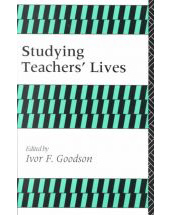Studying Teachers' Lives
Studying Teachers' Lives - problems and possibilities
In awakening to history in our studies of teachers' lives, I have felt for some time that life history work is a most valuable avenue for collaborative, inter-contextual work[i]. The distinction between life stories and life histories is an important one to restate. The life story is a personal reconstruction of experience in this case by the teacher. 'Life story givers' provide data for the researcher often in loosely structured interviews. The researcher seeks to elicit the teacher's perceptions and stories but is generally passive rather than actively interrogative.
The life history also begins with the life story that the teacher tells but seeks to build on the information provided. Hence other people's accounts might be elicited, documentary evidence and a range of historical data amassed. The concern is to develop a wide inter-textual and inter-contextual mode of analysis. This provision of a wider range of data allows a contextual background to be constructed. Life history data can be collected at a number of levels:
- From the teachers' own accounts, but also from more detached research studies, it is clear that the teachers' previous life experience and background help shape their view of teaching and essential elements in their practice.
- The teacher's life style both in and outside school and his/her latent identities and cultures impact on views of teaching and on practice.
- The teacher's life cycle is an important aspect of professional life and development This is a unique feature of teaching. For the teacher essentially confronts 'ageless' cohorts; this intensifies the importance of the life cycle for perceptions and practice.
- The teacher's career stages are important research foci for 'the researcher codes the subjects' words according to certain phases or periods in his or her life, what many qualitative researchers call a previous career'. Becker has argued in his study of school teachers in Chicago that the concept of career is 'of great use in understanding the dynamics of work organizations and the movement and fate of individuals within them'.[ii]
- Beyond major career stages there are critical incidents in teachers' lives and specifically their work which may crucially affect their perceptions and practice.
- Studies of teachers' lives might allow us to 'see the individual in relation to the history of his time... It permits us to view the intersection of the life history of men with the history of society thereby enabling us to understand better the choices, contingencies and options open to the individual[iii]. 'Life histories' of schools, subjects and the teaching profession would provide vital contextual background. The initial focus on the teachers' lives would therefore reconceptualize our studies of schooling and curriculum in quite basic ways.
[i] See Goodson, I.F. (1988) 'Teachers, life histories and studies of curriculum and schooling', in The Making of Curriculum: Collected Essays, London, New York and Philadelphia: Falmer.
[ii] Becker, H.S. (1952) 'The career of the Chicago public school', American Journal of Sociology, Vol. 57, p. 470.
[iii] Bogdan, R. (1974) Being Different: The Autobiography of Jane Fry, New York and Chichester: John Wiley, p. 4.
